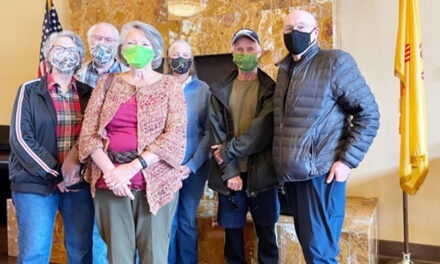Senior Source
An unfortunate reality of our day and age is that scams are on the rise, and senior citizens are especially targeted by fraudsters for several reasons.
“Across the spectrum of age groups, people get scammed, but you do see an increase in elderly individuals,” said Erik Arend, Nusenda’s assistant vice president of fraud prevention and investigation. “That’s mostly because as you grow older, you have more wealth so they want to target people who they think have more financial resources.”
Bosque Farms Police Chief Andrew Owen said scams are becoming more robust and widespread due to new technology, so seniors are also especially targeted by scammers due to generally being less technologically savvy.

Stock image
For example, scammers now have the technology to call you from a number that looks like it is coming from somewhere it’s not, which could be government agencies, banks or someone you are inclined to trust right away.
“Personal information is out there through breaches, social media and the dark web,” Arend said. “They are actively targeting and leveraging that information and are really good at making it seem like they know exactly what they’re talking about.”
Signs of scams
• Empty promises (You have to pay up front without receiving anything in exchange)
• Threatening phone calls (Real legal notices are sent in writing, not over the phone)
• Demands for personal/financial information
• Accepting only wire or gift card payment
• Refusing to give you return contact information
(Courtesy of New Mexico Attorney General’s Office)
Bertha Flores, director of the Belen Retired Senior and Volunteer Program, has seen the detrimental toll scams have taken on the elderly through her role.
A fraudster posing as someone from Amazon called a senior Flores spoke with, asking her to buy several gift cards to pay for items they claimed she ordered.
“They bugged her the whole day, so she spent the day running around getting gift cards,” Flores said. “She scratched all the passwords and gave it to them, and they defrauded her out of a thousand dollars.”
Flores said last year she heard from a distraught senior who said she received a call from PNM saying she owed $1,500 for an electric bill and, if she didn’t pay it, they were going to disconnect her and she was going to have to pay a lot of money to get it back. Thankfully, Flores was able to stop her in time before she handed over any money, but some aren’t as lucky.
“One got defrauded from a romance scam. She told him to send money and she would come visit. He’s bankrupt now — he lost everything,” said Flores.
“Romance scams are still very prevalent. People online will build rapport with you, get you to trust them. Then at some point they are going to want to fly to see you or they need help with legal fees etc.,” said Arend. “Lottery and sweepstakes scams are also common. They say you won some money, but you have to pay taxes and fees upfront. Being critical and skeptical is your biggest ally when it comes to recognizing these scams.”
Owen said a recent scam in the county was door-to-door solar sales.
“The age of door-to-door sales is gone,” the police chief said. “That’s why generally our older citizens are more susceptible to those because that was their era.”
Whether it’s through phone, email, social media or door-to-door, the best way to protect yourself from scams is to do your own verification and validation if you are contacted out of the blue for money or personal information.
“A lot of times when they do finally report (the scam), it usually comes back with, ‘It just seemed a little odd.’ If it seems a little odd, hang up the phone and don’t respond,” said Owen. “Just say, ‘I will call your office at a later time’ and hang up. Then, contact that company yourself because when you call, you know who you’re calling.”
“Your bank knows your Social Security number and your account number; they’re not going to try and solicit this from you,” said Arend. “If you don’t know who you’re talking to and if you didn’t initiate it, hang up the phone and go to a trusted source or website (for the number) and that will ensure you know who you’re talking to.”
Scams often rely on fear and impulsive decisions resulting from it to scam potential victims. A recent scam going around has a someone posing as a grandchild, niece or nephew, saying they are in a dire situation and need financial help.
Other resources
• New Mexico Aging and Long-Term Services Department: aging.nm.gov/protecting-adults/avoiding-scams-fraud
• New Mexico Attorney General’s Office: aging.nm.gov/protecting-adults/avoiding-scams-fraud
• Nusenda Credit Union | Fraud prevention: nusenda.org/member-benefits/security-center/fraud-prevention
• National Elder Fraud Hotline staffed by professionals who know how to support victims of fraud. They can be reached at 833–372–8311 from 10 a.m. to 6 p.m., Monday-Friday, eastern time.
In these situations, Arend says to take a breath and to think critically. Ask yourself, does this make sense?
“Hang up the phone and call your grandkids directly,” Owen advised. “There have been instances where the scammer has the full name of the grandkid they’re posing as.”
A lot of personal information is drawn out by scammers through social media.
“You have to safeguard your information,” said Owen. “The internet is a wonderful, hateful thing. It can hurt you just as much as it can help you.”
Arend said a lot of quizzes that appear fun and harmless on social media are also something you should be skeptical of.
“A lot of them ask what’s your dog’s name? What’s your mother’s maiden name? All those are security questions they are trying to draw out,” said Arend.
Fake GoFundMe accounts are also common scams seen on social media.
“People work extremely hard for what they have and they need to safeguard that,” said Owen. “No matter how much we want to help and give, you need to validate who you are sending money to before you donate.”

Stock image
In order to prevent and mitigate further damage from scams, it is important to regularly check your accounts for suspicious activity, such as purchases you don’t recall making.
Once a scammer has your bank information, they can hack your account within minutes. A common occurrence they have been seeing recently is once they have access to your account, they begin to make small, intermittent fraudulent purchases, which can evolve into substantial charges if left unchecked.
“They take $10 one week, $15 another week, and once they get away with it three to four times, they go for a big one to drain the account,” said Owen. “The next thing you know, you go to pay a bill and it says insufficient funds. If people don’t monitor their bank statements, they’re not going to be able to catch it in time.”
If you are scammed, Owen says to immediately contact your financial institution to freeze your accounts and then report it to law enforcement. Unfortunately, in most cases, funds can’t be recovered, which is why it’s important to be proactive.
“We can help secure your information, but once that money leaves our institution, it’s most likely going overseas or somewhere we can never call it back,” said Arend “If it’s a wire and we catch it fast enough, within hours, we can try to get it back but that’s not a given.”
Owen encourages community members to get in touch with law enforcement to report scams they come across so they are aware and so they can send it to the New Mexico Attorney General’s office for investigation.
Arend said financial institutions encourage people to send this information as well because it could prevent further fraud in the community.
As some final words of advice, Arend recommends having secure passwords and to not use one password across all your accounts. If you get an email about a breach, make sure you update your information. Be wary of unexpected, suspicious links which often contain misspellings or out of place characters. Talk to trusted individuals if you suspect something.
If you don’t have someone you feel like you could discuss this with, Flores said to get in touch with RSVP.
“I get it all the time that they don’t want to bother, but they’re not,” she said. “That’s what we’re here for — to help our older community.”
RSVP can be reached at 505-966-2567.
Felina Martinez was born and raised in Valencia County. She graduated from the University of New Mexico in 2021. During her time at UNM, she studied interdisciplinary film, digital media and journalism. She covers the village of Los Lunas, Los Lunas Schools, the School of Dreams Academy and the town of Peralta.





















